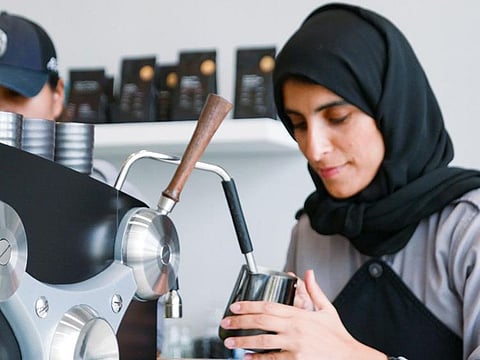Love of good food and globalisation sees boom in Emirati food entrepreneurs
Emiratis behind 3Fils, Monno, Slaw, Coffee Architecture share food business tips, tricks

Dubai: Every other day we receive a press release announcing an opening. Coffee houses with Boho-chic interiors; casual diners with unique food concepts; restaurants with elevated cuisine are mushrooming across the UAE’s culinary landscape. An ongoing trend you might say but something else struck us. Each of them were Emirati-owned – curated, with a story to tell.
We spoke to several young Emiratis food entrepreneurs to understand why many of them were entering into the food and beverage (F&B)sector, the lessons they had share and why this was the place to be if you wanted to have an impact on the culinary world.
For 29-year-old Mohamed Jamal Al Shamsi, CEO and co-founder of Monno, an Italian, casual-dining eatery, his visits to Italy inspired him to start his business.
Al Shamsi is a pilot by profession and made frequent trips to the land of pasta, pizza and many more culinary delights. “I went to Italy, tried and tasted Italian food and thought of bringing an authentic experience, which is budget-friendly, to the UAE.”
Al Shamsi, along with his business partner, who is also a fellow pilot, started Monno.
Creativity and love of food – driving forces
What is it about the F&B sector that is continuously attracting young Emiratis?
For Al Shamsi it is “the room to be genuine, clever and creative”, he said. Once you have a unique and authentic concept a food business is “built easily”, according to Al Shamsi.
“Your directions and aims need to be clear right from the beginning. We knew exactly what we wanted to bring to the UAE, we didn’t jump from concept to concept,” he said.
For Monno’s founders, the concept was bringing “an authentic Italian experience to Dubai in a more casual setting”. Therefore, their menu features some of the traditional Italian favourites such as Sorrento-style gnocchi and pizza topped with burrata cheese.
Trying out new restaurants and unique food concepts coming up regularly is part of Dubai’s “food culture”. “Firstly, the culture of dining outside is huge in Dubai and people are very open to trying new places,” the UAE national said.
Al Shamsi named Asian, burgers and fast food places, as some of the different types of cuisines that Emirati-owned food businesses are exploring.
One such eatery is Michelin guide-recognised 3Fils in Dubai. Co-founder and CEO of The Lab Holding, which operates 3Fils, Ahmed Saleh, prides himself in owning his first business when he was just eight years old. So the journey to being a serial businessman today is not an accidental one, and being a food entrepreneur is only one of the many hats he dons.
Entrepreneur at age 8
“We had a fig tree at home, so I used to collect them every Friday and after the Friday prayer, I used to be outside selling them to people after prayer. Although it wasn’t really a business, it was the first of many products I ever sold,” said the UAE national.
With a diverse educational background spanning across programming and disaster management, Ahmed currently manages and runs multiple business ventures simultaneously. However, he recalls how his first restaurant business 3Fils, a Japanese cuisine-inspired casual restaurant, was started in 2013.
“When going to some high-end restaurants, we were not allowed to enter because we were casually dressed or because we didn’t have reservations, and that’s why 3Fils is casual and has a no-reservations policy,” Ahmed added.
3Fils, a harbour-side community-style restaurant serving premium Asian dishes with a Japanese twist, is managed alongside other hospitality, tech and investment businesses, all the while being the CEO and co-founder of start-up studio The Lab Holding.
Other than 3Fils, The Lab Holding also operates BRIX, a home-grown dessert bar, Meelz, an online platform connecting chefs directly to customers, an event management firm Lmmaa and Resto Guru, a restaurant customer management system.
Ahmed, who has previously worked with Dubai Police, Emirates, Dubai Ambulance and the Executive Office, opened 3Fils after having travelled to over 50 countries and visiting hundreds of restaurants to sample countless dishes.
“Team is the key.” This was Ahmed’s response when asked what was the most crucial business lesson he learnt in the last near-decade since starting 3Fils, underlining the need of a reliable group to delegate work.
“While memorable challenges are many, I cannot dismiss COVID-19 as one like many. In a start-up you need to find smart ways to cut cost, and sometimes you need to break rules but in a good way,” Ahmed added, referring to thinking outside the box when one’s back is to the wall while managing a business.
UAE’s tradition inspires culinary businesses
In many Emirati-owned food businesses, the UAE’s history and tradition is evident. Most commonly, it is seen in the speciality coffee shops that have opened.
“I love art, and coffee is art,” remarked Nooran Al Bannay, a UAE national born in Ras Al Khaimah, who was an architectural engineer at state-owned oil giant Abu Dhabi National Oil Company (ADNOC) when dreaming of starting a coffee shop in Abu Dhabi.
“As an architect, I wanted to create a place that inspired people and also served good coffee,” she said. This is when Al Bannay took the entrepreneurial plunge and opened Coffee Architecture, a space that encouraged customers to study and socialise, while being offered artisanal Arabic coffee.
Putting her coffee passion to work
She underwent barista training and a certification course in the US, before going on to launch her café in the El Reem district of Abu Dhabi. “When I serve coffee to my customers I feel good and my purpose in life changed in that moment, so I got my courage to change my career too.”
“And when you get your coffee right and you enjoy the coffee, especially in your mornings, you feel happy and you can go through life even if it is challenging on some days,” Al Bannay added.
However, when the pandemic struck in 2019, merely months after she launched her café, keeping the business afloat amid the crisis was a testing time for her team and her, and Al Bannay revealed how the priority was to keep the staff motivated.
The key was to be creative in day-to-day activities and also be deeply connected with the team to let them know that you are with them, you trust and believe in them.

“The key was to be creative in day-to-day activities and also be deeply connected with the team to let them know that you are with them, you trust and believe in them. They need to know they are fine and secure in their work in order to create and innovate together and help each other in the pandemic.”
Most crucial business lesson you learnt? Know your numbers!
“You need to know your numbers! Be friends with numbers and you need to read the numbers, so you can decide what you can do in your business,” explained Al Bannay, who started her café with Dh300,000 of her personal savings, with no partner or investors.
“You need to be friends with numbers and knowing your numbers daily that gives you the power of control in your business. Cash is the king and you need to know the difference between cash and profit.”
One tip that Al Bannay offers entrepreneurs is to always learn and be open minded to new things when coming up in the business world. “Focus on your growth (spiritual, self, money) have always a growth mind-set and go all out each day.”
Al Bannay is not isolated in the pool of Emirati-owned coffee shops that have opened in the UAE. It’s a trend that all of the food businesspeople we spoke to have noticed.
Emirati burger connoisseur in the making
With over 10 years of experience in the food industry and culinary degree, UAE national Ali Yazdi revealed how he turned owner and executive chef of Jumeirah-based burger restaurant Slaw. Training to be a chef at the age of 18, Yazdi channelled his experience into his love for burgers, with the launch of Slaw in 2021.
“I definitely see an increase in the Emirati-owned food businesses that are opening up. Many of them get into coffee shops, coffee roasting, burger joints and pizzerias,” he said. Speaking about why he thinks Emiratis are getting into businesses that revolve around these types of foods, he said: “It’s easy, they’re [these foods] popular, trendy and hyped up, especially on social media. Also, they mirror the food habits of the young generation right now. We [young Emiratis] drink a lot of coffee – it’s just the culture of drinking Gahwa (Arabic coffee) modernised.”
For Yazdi, it was burgers that he wanted to experiment with the most and introduce new combinations in the Dubai food industry, so he opened Slaw.
“I personally love spicy food, fried chicken and burgers, and what’s better than having all of them in a bun?” said Yazdi, who for the past few years has being experimenting on different ways to have fried chicken without that ‘heaving oily feeling after eating it’.
“And through special techniques and ingredients, I have perfected it. So that you can enjoy your fried chicken and feel light after it,” said Yazdi. “But with all the experience gathered over the past year after starting Slaw, the goal was to learn and understand the market well and know what are their exact needs and demands from a burger joint, all while making sure to provide them premium quality and experience at an affordable price.”
Premium quality comes at a cost
The lesson Yazdi learnt over the past decade was how to reduce the wastage or reuse waste products, and that helps the business save a lot in terms of costs. Additionally, Slaw’s primary philosophy revolves around better ingredients, which can translate to higher operating costs compared to its peers.
“Well with everything comes a cost, better ingredients means higher food cost. But this just means we have to cut cost on unnecessary things like reducing the quality of paper bags and disposable culinary.”
Yazdi said he follows a semi self-serve service at his outlet and this has understandably reduced the business’ profit margin, while adding Slaw has a food cost percentage of approximately 35 per cent.
What is a food cost percentage? What is a good percentage for food cost?
Food cost percentage is the ratio of the amount of money your restaurant spends on food and beverage ingredients (food inventory) to the revenue those ingredients generate when they're sold as menu items (food sales). It's expressed as a percentage of total revenue from food sales. Most restaurants across the industry aim for a food cost percentage between 28 per cent and 35 per cent. That said, every restaurant is unique — a lower food cost percentage may still drive profits for a quick-serve restaurant, or a restaurant located in a small town.
In the UAE, the community comes together
One of the forces that helped Yazdi’s burger business was the support and appreciation he received from his family and Emirati community.
“When a young Emirati opens a food business I have seen that other Emiratis try to visit it and support it. If it is good, they will spread a good word across too,” Yazdi said.
Yazdi also witnessed support from the Emirati influencer community. “Many influencers who are very famous and mostly get paid for their content have also visited to support my business. They have posted content for free. I was so surprised to see such support,” he added.
Such efforts are also seen in Emirati households, Yazdi shared. “If there’s an event like a party or wedding at someone’s home, it’s common to see catering arranged from an Emirati-owned food business,” he said.
How did you fund your business?
When it comes to funding his business, Yazdi explained how it cost roughly Dh3.6 million to start Slaw, which he partly funded from his personal savings and the rest with an investor and his own family.
“Around 25 per cent of the initial investment cost was from my savings. I have an investing partner and I also got some funds from my family members. This was because the project was huge for a burger joint, so it needed an investor and of course savings helped too.”
I have two adages that I often say to my friends and start-up entrepreneurs when I meet them: ‘Believe in what you are doing’ and ‘You don’t need to be first in market, but you can be the best’

Yazdi’s tip for fellow entrepreneurs is to “catch your dreams, and bring them into reality”. “I have two adages that I often say to my friends and start-up entrepreneurs when I meet them: ‘Believe in what you are doing’ and ‘You don’t need to be first in market, but you can be the best’.
An adage many young Emirati entrepreneurs seem to be following that they make a mark in the culinary sector.
Sign up for the Daily Briefing
Get the latest news and updates straight to your inbox




